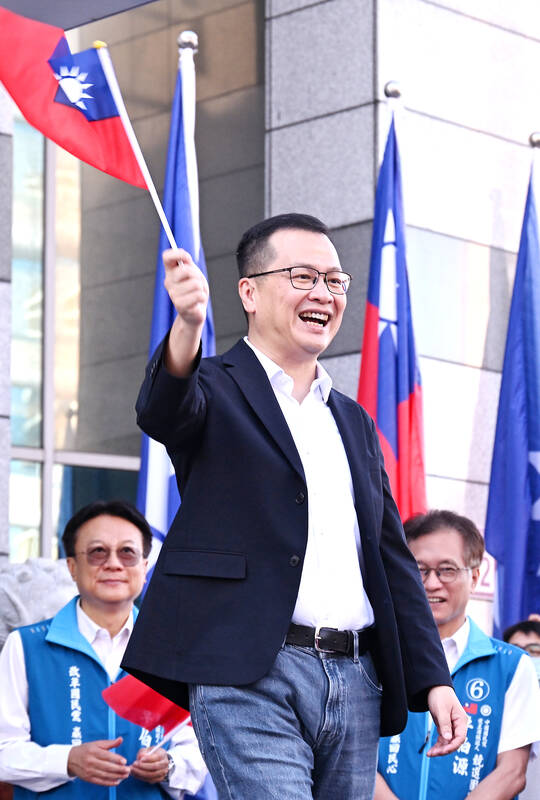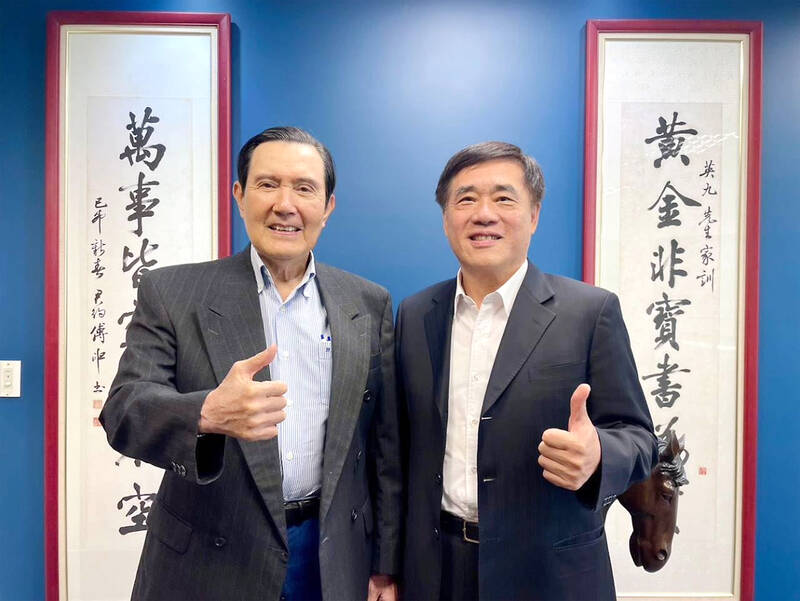With one week left until election day, the drama is high in the race for the Chinese Nationalist Party (KMT) chair. The race is still potentially wide open between the three frontrunners.
The most accurate poll is done by Apollo Survey & Research Co (艾普羅民調公司), which was conducted a week and a half ago with two-thirds of the respondents party members, who are the only ones eligible to vote. For details on the candidates, check the Oct. 4 edition of this column, “A look at the KMT chair candidates” on page 12.
The popular frontrunner was 56-year-old Cheng Li-wun (鄭麗文) with 30 percent, the candidate with the most institutional support was 73-year-old former Taipei Mayor Hau Lung-bin (郝龍斌) at 17.4 percent, and trailing Hau within the margin of error is talk show favorite and lawmaker Lo Chih-chiang (羅智強) at 16.3 percent.

Photo: Liao Chen-huei, Taipei Times
The combined total of the three frontrunners’ support is almost exactly two-thirds at 63.7 percent, which means the vote is up for grabs. This is because Taiwanese often vote strategically via the “dump-save effect” (棄保效應), whereby voters “dump” their preferred candidate because they suspect they might lose, to “save” a candidate who is preferable to the other frontrunner.
With Cheng’s popular support and Hau’s institutional support, Lo is the most likely target of “dump-save,” and he is running scared. Rather ludicrously, he is trying to take the high ground on “insisting” that the party chair election should not involve internal fighting or manipulation of “dump-save,” in other words, trying to portray himself as the moral, party-loving candidate above the fray, while insinuating that his opponents are “manipulating” it to their benefit.
Of course they are, and they should — it is a standard democratic political strategy, not a “manipulative” nefarious scheme that he would like people to think he is too high-minded for. He is aware and candid about the risk, saying it is like having “both hands tied, making it very awkward to fight.”

Photo: Fang Pin-chao, Taipei Times
Both Lo and Cheng are campaigning as the “generational reform” candidates, so it is hard to differentiate between Cheng’s normal campaigning and any efforts to get voters to “dump” Lo. She would likely be the bigger beneficiary if it does happen, though.
Hau rather brazenly tried to paint himself as being supported by — and the natural successor to — former president Ma Ying-jeou (馬英九), trying to undermine the impact of Lo’s one major endorsement and gain those votes. Lo was a close aide to Ma, and Ma released a video explicitly endorsing Lo.
In a Facebook post, Hau wrote he was “very emotionally inspired” when Ma allegedly said, “I am here, you do not need to worry.” There is no clear endorsement here, but the post was constructed to imply there was.

Photo courtesy of Hau Lung-bin’s Facebook page
His poor choice of picture to accompany the post somewhat undermined his message. The picture shows Hau and Ma side-by-side in the “smiling thumbs up” pose. Ma’s thumb appeared at half mast, giving the impression he only half endorses Hau, or that he is too frail to get his thumb fully into the upright position, which seems unlikely.
Was Ma signaling something, or did Hau simply make a poor choice on the picture — perhaps because he looked better in this one than in the other photos?
HAU, IS THIS POSSIBLE?
However, it was an “open letter” post by Hau that was the true jaw-dropper, which kicked off with “To my dear rival candidates.” In it, he started off describing himself as a moral paragon and having “always worked sincerely and earnestly” in politics, and defended himself against criticisms brought against him.
At the core, however, the post was a series of remarkable accusations that he is the victim of cyberwarfare that is costing “at least” NT$100 million (US$3.3 million):
“The pan-blue camp does not have such a powerful Internet army; otherwise, we would not have been at a disadvantage in past elections. Where does it come from? Is it mobilized by candidates inside our party? The attacks I received exceeded the so-called Democratic Progressive Party (DPP) “1450” (Internet army)’s battle strength. The underground Internet army, especially combined with foreign Internet armies, is like a war god, invincible everywhere.”
He added: “I want to ask my dear comrades, especially the candidates, are you sure this is a KMT party chair election? I almost thought I was participating in the Ukraine-Russia war.”
Perhaps Hau is trying to emulate the Taiwan People’s Party (TPP) strategy of defending their founder Ko Wen-je (柯文哲) by painting himself as the victim of a conspiracy. The problem for Hau is that Ko has an army of devoted followers, and Hau does not.
Who are these mysterious “foreigners” with the time, money and energy to care about him? The term he used for “foreign” literally means “outside our borders” (境外), so theoretically he could be including China in his suspicions, but that seems unlikely — as does any other foreign power.
Who inside the party has NT$100 million to launch this campaign, when it is the wealthy, institutional figures in the party backing him? And if it exists, why has it been so inept that the criticisms aired against him in the press are so tepid?
It comes across as if he is desperately casting about for scapegoats to explain an upcoming loss, rather than taking the tone of a confident frontrunner. Hardly inspiring.
In the Apollo poll, Hau came out ahead in expectation he will win at 27 percent, slightly ahead of Cheng’s 26.1 percent.
In theory, his institutional support from key influential blocs should be able to mobilize a strong get-out-the-vote campaign. However, that requires spending political capital; these voters will be expecting something in return for their loyalty, regardless of whether that quid pro quo is explicit or implicit. After reading Hau’s defeatist, conspiratorial screed, how many will still be willing to risk their political capital to rally to him?
A MERE SCRATCH
As the presumed frontrunner, the knives are out for Cheng, but none have accomplished more than a slight scratch. The usual suspects, including her expulsion/resignation from the DPP and the circumstances surrounding it, are ancient history now.
The closest to striking home was the revelation that when she was a party-list lawmaker, she failed to meet her party fundraising quota. However, once it was made known that before she entered the chair race she paid the shortfall in full, this was largely deflected.
She has maintained message discipline, met with the right people and addressed issues and concerns that KMT party member voters might have.
There are still a lot of votes up for grabs, and a lot can happen in a week. For Cheng, she needs to stay the course and hope there are no last-minute surprises.
For Hau, this is his last chance to save face after a string of humiliating defeats, including two previous failed runs for KMT chair. This former potential future president could even be at risk of coming in third if his institutional backers do not put in the effort to save him.
I think Lo’s main priority in joining this race was to raise his profile for the future. If he comes in second, that would be a huge win for him. At the very least, he desperately needs to avoid being “dumped” in large numbers and pull out a respectable first-time run result.
Donovan’s Deep Dives is a regular column by Courtney Donovan Smith (石東文) who writes in-depth analysis on everything about Taiwan’s political scene and geopolitics. Donovan is also the central Taiwan correspondent at ICRT FM100 Radio News, co-publisher of Compass Magazine, co-founder Taiwan Report (report.tw) and former chair of the Taichung American Chamber of Commerce. Follow him on X: @donovan_smith.

The primaries for this year’s nine-in-one local elections in November began early in this election cycle, starting last autumn. The local press has been full of tales of intrigue, betrayal, infighting and drama going back to the summer of 2024. This is not widely covered in the English-language press, and the nine-in-one elections are not well understood. The nine-in-one elections refer to the nine levels of local governments that go to the ballot, from the neighborhood and village borough chief level on up to the city mayor and county commissioner level. The main focus is on the 22 special municipality

The People’s Republic of China (PRC) invaded Vietnam in 1979, following a year of increasingly tense relations between the two states. Beijing viewed Vietnam’s close relations with Soviet Russia as a threat. One of the pretexts it used was the alleged mistreatment of the ethnic Chinese in Vietnam. Tension between the ethnic Chinese and governments in Vietnam had been ongoing for decades. The French used to play off the Vietnamese against the Chinese as a divide-and-rule strategy. The Saigon government in 1956 compelled all Vietnam-born Chinese to adopt Vietnamese citizenship. It also banned them from 11 trades they had previously

Jan. 12 to Jan. 18 At the start of an Indigenous heritage tour of Beitou District (北投) in Taipei, I was handed a sheet of paper titled Ritual Song for the Various Peoples of Tamsui (淡水各社祭祀歌). The lyrics were in Chinese with no literal meaning, accompanied by romanized pronunciation that sounded closer to Hoklo (commonly known as Taiwanese) than any Indigenous language. The translation explained that the song offered food and drink to one’s ancestors and wished for a bountiful harvest and deer hunting season. The program moved through sites related to the Ketagalan, a collective term for the

As devices from toys to cars get smarter, gadget makers are grappling with a shortage of memory needed for them to work. Dwindling supplies and soaring costs of Dynamic Random Access Memory (DRAM) that provides space for computers, smartphones and game consoles to run applications or multitask was a hot topic behind the scenes at the annual gadget extravaganza in Las Vegas. Once cheap and plentiful, DRAM — along with memory chips to simply store data — are in short supply because of the demand spikes from AI in everything from data centers to wearable devices. Samsung Electronics last week put out word